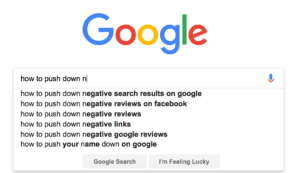
Many people struggle with removing negative content online. Occasionally, the best thing to do is to “bury” negative search results by creating new, positive, content.
Note that if you’re looking to disappear from the web, this is not the solution for you. Instead, you’ll be creating more content about you, allowing you to tip the scale from negative to positive.
Step 1: Create new public profiles for yourself.
Certain sites will always appear at the top of Google search results. You can push down negative results just by creating profiles with your name and a bit of identifying information on these websites. Make sure your privacy settings are set to be publicly viewed, and only post content that you’re absolutely sure you won’t regret in the future. Here is a list of sites to use:
- Twitter http://twitter.com/
- LinkedIn http://linkedin.com/
- Facebook http://facebook.com/
- Google http://plus.google.com/
- Blogger http://blogger.com/
- Tumblr http://tumblr.com/
- Photobucket http://www.photobucket.com/
- Quora http://profiles.google.com/
- Reddit http://www.reddit.com/
- MySpace http://www.myspace.com/
- Formspring https://formspring.livejournal.com/
- Foursquare http://foursquare.com/
- About.Me http://about.me/
- Digg http://www.digg.com/
- Yahoo Pulse http://pulse.yahoo.com/
- Flickr http://www.flickr.com/
Step 2: Use your new “public” online accounts to comment on news articles, forums or social media.
Another option is to use your real name to register on news sites and comment on articles. These types of posts don’t usually rank as highly as the kinds of sites posted above. If you’re ready to do a bit of self-censorship, posting under your real name can be a good way to ‘sell’ yourself. Keep in mind that anything you say online can show up when someone Googles you, so use your postings to your advantage: post intelligent, well-reasoned content that is spell-checked and grammatically correct. Express yourself in the field in which you want to be established.
Step 3: Link to all of your different sites.
One of the ways that Google decides rankings in search results is by seeing how many times other sites link to a specific search result. Your content can rise by simply linking to itself, e.g. create a Twitter account, connect that to your Facebook page, connect both to your Photobucket, and link to them all in your Blogger page. The more you use your accounts and interact with other people using those accounts, the more likely they are to link to your content, which will drive your results even higher.
Step 4: Reclaim negative keywords.
If a generic search for your name is showing positive results, but including a particular keyword brings up negative or unwanted results, you can create content to reclaim that term. For example, if a search for “John Doe” is positive, but a search for “John Doe State College” brings up negative results, creating content including the phrase “John Doe State College” can help push down those negative results.
DeleteMe is our premium privacy service that removes you from more than 30 data brokers like Whitepages, Spokeo, BeenVerified, plus many more.
Save 10% on DeleteMe when you use the code BLOG10.
Our privacy advisors:
- Continuously find and remove your sensitive data online
- Stop companies from selling your data – all year long
- Have removed 35M+ records of personal data from the web
Save 10% on any individual and family privacy plan with code: BLOG10












